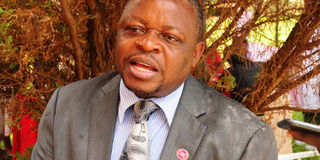Don’t criminalise women who abort, says judge

Justice Batema speaking to journalists on the sidelines of the abortion workshop. Photo by Stephen Otage
What you need to know:
- Unsafe abortion is estimated to contribute to over 26 per cent of the maternal mortalities in Uganda with over 54 abortions per 1,000 women aged between 15 and 49 or 800 abortions per day.
- According to statistics by medical researchers, the cost of treating the consequences of unsafe abortion in Uganda stands at least Shs7.5b per year.
KAMPALA. High Court judge David Batema has scoffed at people who criminalise women who have procured an abortion.
He said that since Article 32 (2) of the Constitution protects marginalised groups including women who abort from laws, culture, customs and traditions that would undermine their status, there is no need to demonise them.
Article 32 (2) states that laws, cultures, customs and traditions which are against the dignity, welfare or interest of women or any other marginalised group which undermines their status are prohibited by the constitution.
The Soroti-based judge who was speaking at the second national conference on unsafe abortion in Kampala added that many women who are aborting have been criminalised by those interpreting the laws with lenses of religious and moral beliefs.
He said the law is blind and that in order to have the women who procure abortion get justice, it should be applied so.
Abortion in Uganda is illegal and can only be permitted in circumstances where life of a pregnant woman is in danger due to the pregnancy.
To that effect, there are conflicting and restrictive interpretations of the abortion provisions under the 1995 Constitution, the Penal Code Act and the national reproductive health policies.
Justice Batema, who is a strong advocate of women issues, said the government is only protecting the outside body of the women and not their rights as the Article 33 demands in order to realise their full potential.
“Article 33 of the Constitution demands that the state shall protect women and their rights taking into account their maternal duties in society. But the state has since refused to comply with this and it has failed to protect their rights but tries to protect their bodies,” Justice Batema said.
“The law we received from England criminalises abortion, it demonises it, why can’t we coin abortion into something else like evacuation, termination of pregnancy, among other names,” he added.
Prof Ben Twinomugisha from the school of Law, Makerere University in his remarks justified the move to have women procure safe abortion without being penalized.
He gave two examples to drive the justification home.
Illustrating his justification, Prof Twinomugisha asks one to imagine a child born out of incest say between a father and his daughter and the second example of a woman who is gang-raped by say 10 men and becomes pregnant.
In both scenarios, Prof Twinomugisha said children born out of such unfortunate scenarios can be painful and that it’s better for the girl to abort.
Unsafe abortion is estimated to contribute to over 26 per cent of the maternal mortalities in Uganda with over 54 abortions per 1,000 women aged between 15 and 49 or 800 abortions per day.
Access to safe and legal abortion is minimal in Uganda, forcing women to resort to clandestine abortions, most of which are performed under unsafe conditions resulting in substantial numbers of preventable deaths and disability.
Abortion stigma is also high in communities due to lack of community senstisation making women who have unwanted pregnancy resort to secretive but dangerous methods of unsafe abortions.
According to statistics by medical researchers, the cost of treating the consequences of unsafe abortion in Uganda stands at least Shs7.5b per year.




